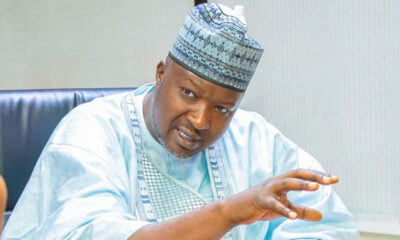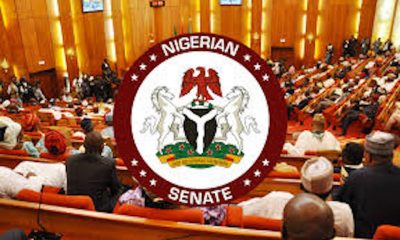News
Aisha Yesufu demands scrapping of Senate to reduce governance cost

Aisha Yesufu demands scrapping of Senate to reduce governance cost
Yesufu, Co-founder, Bring Back Our Girls Movement, made the call in an interview with the News Agency of Nigeria (NAN) on Sunday in Lagos.
She was reacting to calls in some quarters that the country should jettison its bicameral legislature and adopt a unicameral legislature to reduce the cost of governance.
NAN reports that unicameral legislature is a system with one chamber or house, as opposed to bicameral legislature which has two chambers (Senate and House of Representatives).
Some countries with unicameral legislatures include China (National People’s Congress), Sweden (Riksdag), Norway (Storting), Denmark (Folketing), and Portugal (Assembly of the Republic).
The activist said Nigeria could, alternatively, consider re-introduction of the parliamentary system of government to reduce the heavy funds spent on the National Assembly.
According to her, until something is done about the cost of running government and corruption, Nigerians will not feel the dividends of democracy.
“We need to really and critically examine our democracy and look at what fits us and serve the ordinary people and the masses. The one that will not be too expensive.
READ ALSO:
“What we have now is too expensive. We need to cut costs and not just continue what we have that has not been working for Nigerians.
“I totally support the call for us to have a unicameral legislature. It is very important because the kind of governance that we are practising is very expensive.
“As a country, we really don’t have that kind of money. Apart from this, the fact is that both the Senate and House of Representatives end up duplicating functions in terms of what they do,” Yesufu said.
She said the Senate had been turned into “a retirement home for a lot of incompetent and failed governors who didn’t do anywhere well for the people in their state”.
She said that Nigerians had continued to bear the brunt of the hit on resources annually allocated to these political ‘retirees’ in the Senate.
Yesufu added: “It (Senate) is a joke ground; we cannot say what the Senate does is in a real sense different from what the House of Representatives do.
“They (Senators) do nothing special and at the end of the day, they are paid humongous amounts of our money and such huge allowances for doing nothing different.
“We found out that a good number of them, especially those that are former governors, while they get this humongous salary, are as well collecting pension from their respective states.
“There is no way democracy can work for the masses with this kind of waste of public funds that could have been directed to put happiness to the face of the common man.”
According to her, Senegal is practising a unicameral legislature, after abolishing Senate for the second time in September 2012.
She said: “The House of Representatives is capable of taking care of the law-making aspect of the nation, oversights and other things that the legislative arm of government does.
“Unicameral legislature should be adopted in Nigeria because bicameralism is too expensive apart from the fact that it slows down the business of lawmaking.
“It is not working for us, we don’t have the kind of money to run it and maintain this, especially at a time when the masses are suffering.
“Having a single legislative arm will pay us better in terms of reduction of cost of governance,” she said.
Yesufu decried that Nigeria had not in a real sense been practising a true federal system of government.
Speaking further, the activist said the country could also adopt the parliamentary system of government to reduce the cost of governance.
She said that Nigeria could no longer sustain the current presidential system of government.
“This will also pay us in terms of reduction of the cost of governance because whoever is leading the country is the one that is the first among equal.
“Ministers in this system are selected from members of the parliament that are elected.
“So, that reduces the cost of governance drastically and better than what we have now where separate people are brought in as ministers,” she said.
The activist said that both the bicameral legislature and the presidential system of government had brought a lot of pressure on the nation’s resources.
“We can have a parliamentary system of government, we shall be reducing cost of governance drastically well.
“The Prime Minister would not be this powerful and exercise control over everything, including the appointed ministers, because ministers are also members of the parliament,” she said.
Aisha Yesufu demands scrapping of Senate to reduce governance cost
News
FG Allocates ₦5.6bn for New Carter Bridge as Old Structure Fails Safety Test

FG Allocates ₦5.6bn for New Carter Bridge as Old Structure Fails Safety Test
The Federal Executive Council (FEC) has approved the demolition and complete reconstruction of Carter Bridge in Lagos, declaring the ageing structure beyond rehabilitation. The decision aims to ensure road safety, reduce congestion, and modernize one of Nigeria’s most critical transport arteries.
Minister of Works, David Umahi, disclosed after the council meeting chaired by President Bola Tinubu that ₦5.6 billion has been allocated to hire advanced engineering consultants for the design and cost assessment of the new bridge. Umahi explained that extensive technical assessments and consultations revealed that the current bridge could no longer safely serve traffic.
“The total recommendation was that Carter Bridge can no longer be rehabilitated; it should be demolished and a new bridge constructed,” Umahi said.
Carter Bridge connects Lagos Island to the mainland and is a vital corridor for commuters, cargo vehicles, and commercial traffic. Its reconstruction is expected to ease traffic congestion, improve transportation safety, and support economic activity in Nigeria’s largest commercial hub.
READ ALSO:
- Iran Launches Missiles at Israel as Middle East War Enters Sixth Day
- US Submarine Sinks Iranian Warship in Indian Ocean as Conflict Escalates
- Court Orders INEC Chairman to Appear Over Alleged Contempt of Court
Part of a Nationwide Infrastructure Upgrade
The Carter Bridge project forms part of a broader federal infrastructure program. FEC also approved several major road projects across the country, including:
- Reconstruction of the Ibadan–Ife–Ilesa Road in the Southwest
- Redesign of the Kano–Kongolam Road in Northern Nigeria
- Rehabilitation of the Keffi–Nasarawa–Abaji Road in the North-Central region
- Completion of the Suleja–Minna Road
- Reconstruction of the Abuja–Lokoja Road
Umahi emphasized that these are strategic, long-term infrastructure projects, not temporary fixes, and the government aims to deliver at least four completed projects per region for presidential commissioning by May 15.
“These are not palliative works; they are major infrastructure projects for national development,” the minister added.
Modernization and Economic Impact
The new Carter Bridge will incorporate contemporary engineering standards, enhanced durability, and increased capacity for vehicles and pedestrians. Officials say the project will also attract private sector participation, create skilled jobs, and strengthen Lagos’ transport network.
By replacing the ageing structure, the federal government intends to ensure that major transport routes across Nigeria meet modern safety and operational standards, while supporting economic growth and improving daily mobility for millions of Lagos residents.
FG Allocates ₦5.6bn for New Carter Bridge as Old Structure Fails Safety Test
News
ICPC, NRC Forge Anti-Graft Alliance to Safeguard Rail Assets
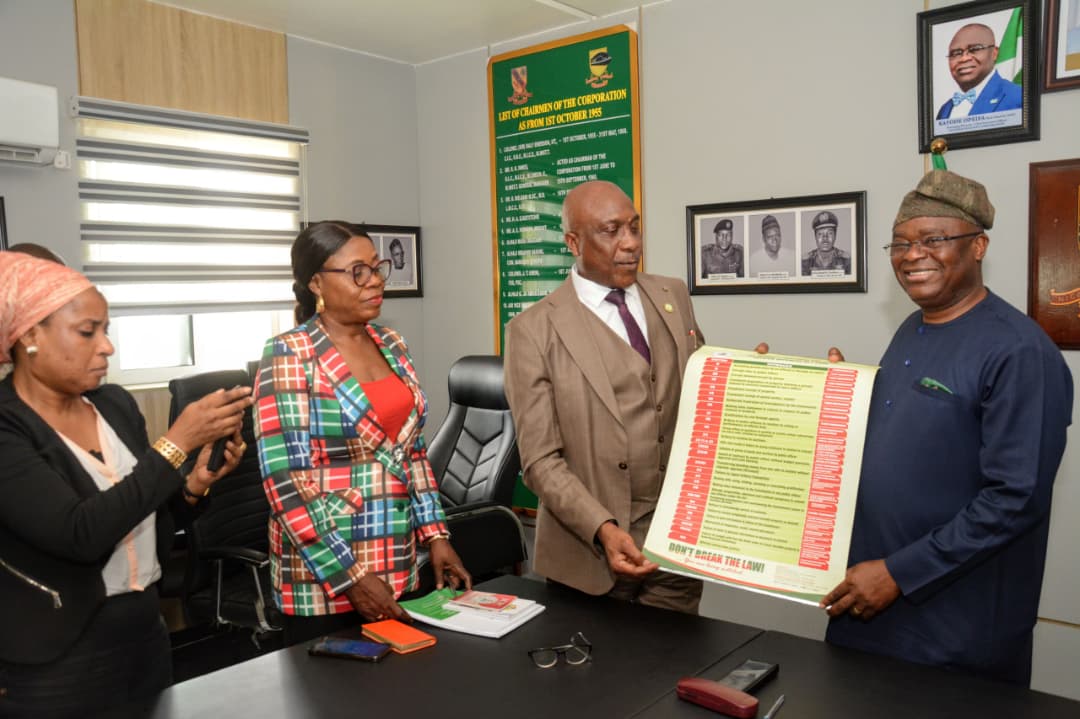
ICPC, NRC Forge Anti-Graft Alliance to Safeguard Rail Assets
The Independent Corrupt Practices and Other Related Offences Commission has pledged closer collaboration with the Nigerian Railway Corporation to strengthen transparency and accountability in the country’s rail sector.
The Resident Anti-Corruption Commissioner (RAAC), Lagos Office, Mr. Alexander Chukwumah, gave the assurance during a courtesy visit to the NRC Managing Director, Dr. Kayode Opeifa, at the corporation’s headquarters.
Chukwumah said the commission was prepared to support the NRC through targeted training programmes aimed at equipping staff with the knowledge to identify and avoid actions that could expose them to corruption-related offences.
He explained that the initiative aligns with the ICPC’s public education mandate to promote integrity across public institutions.
He urged the management of the corporation to work closely with its Anti-Corruption and Transparency Unit, noting that members of the unit had been trained to detect early warning signs and red flags capable of preventing minor lapses from escalating into major institutional crises.
According to him, the visit was also to reinforce the cordial relationship between both agencies and reciprocate the goodwill earlier extended by the railway corporation.
“ICPC is committed to ensuring that NRC workers stay out of trouble. There are ways we can guide you and your team to avoid actions that could expose them to corruption risks,” Chukwumah said.
In his response, Opeifa welcomed the partnership and expressed readiness to deepen collaboration with the anti-graft agency to entrench transparency within the corporation.
The NRC boss observed that the railway system could have achieved greater milestones over the years but for corruption-related setbacks that slowed its growth.
He requested the commission to organise a capacity-building programme for heads of departments and senior management staff to sharpen their understanding of compliance standards and ethical decision-making.
Opeifa identified vandalism of railway infrastructure as a major operational challenge, stressing that the destruction of critical assets continues to strain service delivery.
As part of efforts to curb the menace, he presented anti-vandalism sweatshirts to the ICPC delegation bearing the inscription: “Rails and railway assets are critical national treasures and not scraps.”
He maintained that the corporation operates a strict disciplinary regime, warning that any staff found culpable of collusion or sabotage faces immediate dismissal.
He also commended NRC engineers and other personnel for sustaining operations despite logistical and infrastructural challenges.
On the corporation’s long-term direction, Opeifa reiterated the NRC’s Vision 2-5-10-20 development framework aimed at modernising and expanding the rail network.
He said the first phase prioritises optimising legacy lines and reviving abandoned corridors that once served as economic lifelines, including the Kaduna–Nguru–Kaura Namoda route, with plans to restore services to Zamfara State within the year.
He added that the corporation is advancing a freight-by-rail drive under its “Railing with the States” initiative to enable sub-national governments leverage rail infrastructure for economic growth and enhance connectivity to the nation’s seaports.
Opeifa further disclosed that the NRC plans to gradually transition from diesel-powered locomotives to cleaner energy sources such as gas within the next five years, subject to funding, while working towards doubling Nigeria’s rail assets by 2035.
News
Tinubu swears in Disu as substantive IGP, chief inaugurates up state police committee

Tinubu swears in Disu as substantive IGP, chief inaugurates up state police committee
President Bola Tinubu on Wednesday swore in Olatunji Disu as the substantive Inspector-General of Police at the Council Chambers of the State House, Abuja, as the new police chief immediately inaugurated a committee to drive the implementation of state policing.
Disu took the oath of office at 2:53pm after his citation was read by the State House Director of Information and Public Relations, Mr Abiodun Oladunjoye.
The brief ceremony, witnessed by Vice President Kashim Shettima, members of the Federal Executive Council and other top government officials, preceded the FEC meeting, which commenced at 3:01pm.
Among dignitaries present were the Secretary to the Government of the Federation, George Akume; National Security Adviser, Nuhu Ribadu; Chief of Staff to the President, Femi Gbajabiamila; Minister of Police Affairs, Ibrahim Gaidam; FCT Minister, Nyesom Wike; and Head of Service, Mrs Esther Walson-Jack.
The President also swore in newly appointed commissioners of the Revenue Mobilisation Allocation and Fiscal Commission and the Federal Civil Service Commission.
Disu’s confirmation followed his unanimous endorsement by the Nigeria Police Council on Monday, barely a week after Tinubu appointed him acting IGP in the wake of the resignation of his predecessor, Kayode Egbetokun, on February 23, 2026.
At Monday’s Police Council meeting, Lagos State Governor, Babajide Sanwo-Olu, reportedly commended Disu’s track record, particularly his tenure as Commander of the Rapid Response Squad in Lagos between 2015 and 2021.
Nasarawa State Governor, Abdullahi Sule, also described the appointment as merit-based, while Enugu State Governor, Peter Mbah, seconded the motion endorsing him.
Disu, 59, joined the Nigeria Police Force as a Cadet Assistant Superintendent of Police on May 18, 1992. Before his elevation, he served as Assistant Inspector-General of Police in charge of the Special Protection Unit and the Force Criminal Investigation Department Annex in Lagos. He previously held key roles in Lagos and Rivers states.
Hours after his inauguration, the new IGP held his first formal engagement with senior officers, during which he announced the constitution of an eight-member committee to oversee the implementation of state policing.
Professor Olu Ogunsakin was named chairman of the committee.
Addressing the force hierarchy, Disu said leadership was “not about position but responsibility,” stressing that professionalism, discipline and accountability must guide policing nationwide.
He underscored the need for restraint in the exercise of authority and respect for human rights, insisting that all Nigerians must be treated with dignity and fairness irrespective of status.
The IGP also pledged to strengthen internal oversight mechanisms, directing that the Public Complaint Unit and the X-Squad be empowered to operate independently.
On decentralisation, Disu said state policing would enable different tiers of government to play more active roles in addressing security challenges across the country.
-

 International3 days ago
International3 days agoSeveral U.S. Warplanes Crash in Kuwait Amid Ongoing Iranian Strikes
-
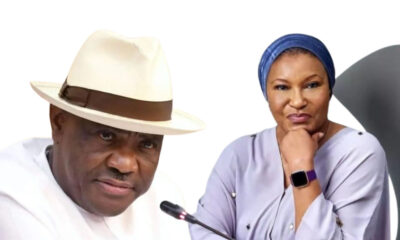
 Politics3 days ago
Politics3 days agoWike Blasts Kingibe Over FCT Council Election Remarks
-

 International3 days ago
International3 days agoIsraeli Airstrikes Kill 31 in Lebanon as Hezbollah Loses Senior Figures
-

 Health3 days ago
Health3 days agoNigeria to Receive Breakthrough HIV Prevention Drug This Month – NACA
-
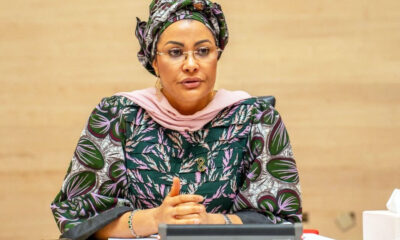
 metro1 day ago
metro1 day agoHow Ikwechegh’s ₦1.15tr Interrogation Led to Tinubu’s Cabinet Shake-Up
-

 metro2 days ago
metro2 days agoDSS Busts Alleged Arms Trafficking Network in Gombe, Seizes RPGs
-

 News2 days ago
News2 days agoRelief Radiant Hearts Foundation Launched in Iwo, Promises Hope for the Vulnerable
-
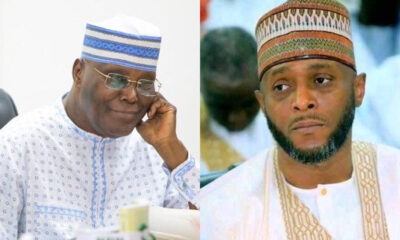
 Politics2 days ago
Politics2 days agoAtiku’s Son Resigns as Adamawa Commissioner Following Fintiri’s APC Defection



